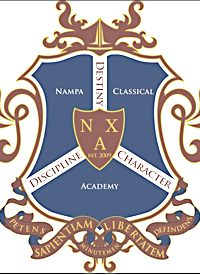
A federal appeals court has ruled that the founders of an Idaho charter school may not sue state officials who banned the school from using the Bible and other Christian texts in the classroom. The Associated Press reported that a panel of judges from the 9th Circuit Court of Appeals upheld the ruling of a lower court against the Nampa Classical Academy (NCA, emblem at left), which the Idaho Public Charter School Commission closed last year, citing financial concerns. According to the Idaho Reporter, the school’s charter “was yanked by the commission because panel members weren’t confident in the financial soundness of the school. NCA parents and officials say that the commission unfairly singled out their school because of its desire to use religious texts, like the Bible, in the classroom.”
As reported by the AP:
The founders of the charter school tangled with Idaho officials over the use of the Bible and other religious texts shortly after opening in August 2009 with more than 500 students in southwestern Idaho. The academy filed a federal lawsuit against Idaho officials in September 2009.
In an earlier decision, U.S. District Judge Edward Lodge ruled that banning religious resources did not violate the school’s rights and dismissed that lawsuit. The school officials appealed that decision to the 9th Circuit, which overturned Lodge’s ruling that the academy’s founder Isaac Moffett lacked the legal standing to sue the state. But the judges affirmed Lodge’s decision barring the school’s use of the Bible and other religious materials, which Moffett had argued was a violation of the First Amendment’s free speech guarantee.
In the court’s ruling, the judges said that the First Amendment does not “give Idaho charter school teachers, Idaho charter school students, or the parents of Idaho charter school students a right to have primary religious texts included as part of the school curriculum.”
The AP continued:
A deputy attorney general who serves as counsel to the Idaho charter school commission concluded in 2009 that the state constitution “expressly” limits use of religious texts. The commission, which was created in 2004 to give charter schools an alternative route to approval besides the local school board, adopted that opinion and told Nampa Classical Academy it couldn’t use these texts.
David Cortman, senior legal counsel with the Alliance Defense Fund (ADF), the legal advocacy group representing Moffett and the charter school, told the Idaho Press-Tribune in an e-mail that he is prepared to appeal the case to the Supreme Court. “In our opinion, the court failed to perform any meaningful analysis of any issue in the case,” Cortman wrote, “including the seminal one: whether there is any educational purpose to ban all religious documents from objective teaching….” In addition, he charged, the 9th Circuit panel ignored the right of local school districts to choose their own texts and curricula.
“Censoring books, including religious books, is not the proper way to educate children,” Cortman said in an ADF statement, adding:
The court’s opinion requiring the removal of religious books to comply with the so-called “separation of church and state” conflicts with established U.S. Supreme Court precedent stating that “the Bible may constitutionally be used in an appropriate study of history, civilization, ethics, comparative religion, or the like.”
The Press-Tribune reported that the next step for the ADF “is to file for a ‘rehearing en banc,’ which will request the case be heard by all judges within the 9th Circuit. If the ruling is not overturned during ‘en banc’ proceedings, ADF will file a petition to submit the case for review in the Supreme Court.”



